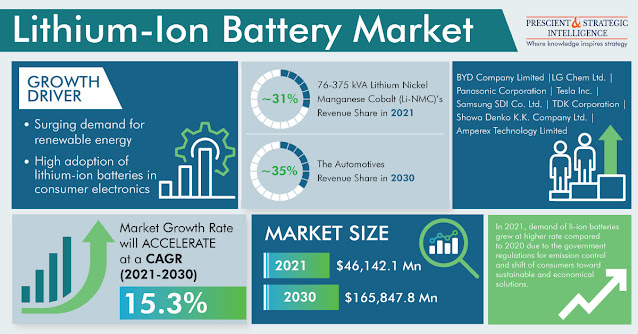Due to the increasing demand for renewable energy and the high adoption of lithium-ion batteries in consumer electronics, the global lithium-ion battery market was worth $46,142.1 million in 2021. By 2030, with a high CAGR of 15.3%, the market size is expected to reach $165,847.8 million. The key factors responsible for the rising usage of these energy storage devices include a growing focus on environment-friendly practices, rising energy demand, and low operating and maintenance cost of lithium-ion batteries.
In 2021, Li-NMC versions accounted for 31.4% of the total lithium-ion battery market revenue. Because of their long life, large storage capacity, and excellent temperature stability, Li-NMC batteries are mainly utilized in electric vehicles and consumer devices. Moreover, battery researchers and designers are concentrating their efforts on reducing the cobalt percentage in the NMC cathode, which will decrease the cost of the battery and propel the market in the coming years. Furthermore, because these energy storage systems have high specific energy, most automotive businesses use them in EVs.
According to the United Nations, transportation networks have a substantial environmental impact, accounting for around 25% of the worldwide greenhouse gas emissions. As a result, governments are encouraging the usage of EVs to achieve a sustainable and environment-friendly lifestyle. Furthermore, as a result of the increasing oil costs, the demand for EVs has risen considerably in recent years, thus favoring the lithium-ion battery market. For example, the price of diesel has risen from $2.56 per gallon to $3.54 per gallon from 2020 to 2022, as per the U.S. Energy Information Administration.
The existing production capacity needs to be significantly increased, which presents an opportunity for businesses looking to invest in the lithium-ion battery market in certain locations. The acceptance of these solutions across a wide range of applications would be catalyzed by the lowering component prices, mass production, and the adoption of innovative technologies to enhance battery capacity and decrease the price. The cost of lithium-ion batteries has dropped by 85% in the last decade, thus making EVs and energy storage devices financially viable.
Li-ion battery recycling trends, favorable government legislations, advancements in environment-friendly technology, and expanding investor stake in the business are all contributing to an increase in the worldwide production of sustainable alternatives. Because of their high specific power/energy density, lithium-ion batteries have overcome the intermittency difficulties connected with renewable energy. They may be used to store the excess energy produced by wind and solar facilities during low-demand periods and then sell it to the market when the demand spikes.
In 2021, the APAC lithium-ion battery market earned $24,586.2 million in sales and held the largest share. Consumer electronics sales are rising in the region, which is boosting industry development. The use of these batteries is also aided by the fast technological advancements and increasing demand for smart gadgets. Moreover, electric car prices are decreasing in the region, thereby increasing the use of lithium-ion batteries in South Korea, India, Japan, and China.
Hence, the low maintenance and operating cost of lithium-ion batteries are propelling the market growth.









